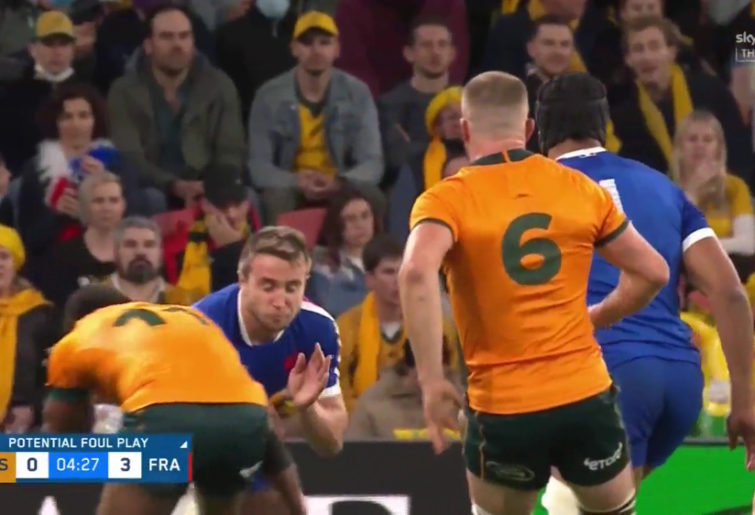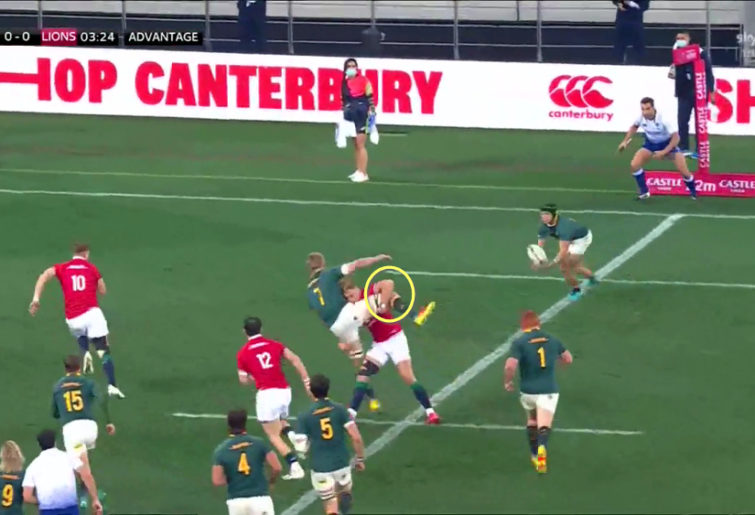Once again, a big thank you to all who posed a question, or refined one during the debate at call-out.
Did the South African scrum improve immensely, did the Lions buckle or was it down to refereeing perception?
– Oblonsky’s Other Pun
Did you read the story about how Rassie approached WR and Jerome Garces to correct their mistakes after the opening match in World Cup 2019 [versus New Zealand]? Garces got the scrum calls all wrong by awarding the wrong team the penalties. If Garces had correctly applied the laws then Boks with the dominant scrum would have won the scrum penalties.
– CPM
Do you support ‘reward’ penalties, when one team wins a penalty for perceived positive play – for example, a dominant scrum penalty?
– In Brief
How much influence does coach’s comments have on referees and the game? It seems like penalties are awarded in scrums based on perception of dominance.
RugbyRah
The Second Test between the Springboks and the Lions was all about influencing refereeing perception before the event, and there is no area of Rugby which is more open to subjective interpretation than the scrum.
The Springboks depend heavily on winning penalties at the scrum, and they were awarded five penalties in the 2019 final against England by French referee Jerome Garcès.
After the first group game against the All Blacks in 2019, which South Africa lost, an anonymous video had appeared laying bare all of Garcès’ alleged errors during the match on social media. It racked up over 200K views in its first two days of exposure. Sounds familiar?
So, how much dominance in the scrum did the Springboks really achieve against the Lions in the Second Test? We can examine that question by tracking the battle between Springbok tighthead Frans Malherbe and Lions loosehead Mako Vunipola over the two matches.
Both came off the bench in the first game, and it was firmly established that when the scrums remained square, there was deadlock, and no chance of Malherbe pushing through Mako directly.
Here is a typical example.
There is no foot movement, the Lions are under no pressure at all, and Jack Conan is free to relax and pick up the ball at the base.
When South Africa attempted to disrupt the Lions’ feed, they did so by turning the scrum around their loosehead Steven Kitshoff. Malherbe and hooker Malcolm Marx would push towards the middle of the tunnel, while Kitshoff and the second row and flanker on his side, walked around the far corner.
The South African front row ends up looking towards the side-line, and Nic Berry awards the Lions a penalty. It was probably one of the decisions which contributed to Erasmus’ social media attack on the referee afterwards.
In the second game, Vunipola and Malherbe found themselves in opposition as starters rather than finishers. The referee Ben O’Keefe was noticeably more patient with their attempts to their attempts to spin the scrum around their loosehead.
This set-piece was reset three times, and three minutes of the game were wasted. In TV commentary, Nigel Owens drew attention to the habit of the South African second row and loose forwards, shifting their feet sideways to move the scrum from right to left.
If a team refuses to move the ball out of the scrum, it creates an awkward problem for the referee, who is then forced to resolve the set-piece with a call of his own.
This was a gutsy decision by Ben O’Keefe. Just before his arm goes out, he calls for the Boks to use the ball. The Bok number 8 Jasper Wiese holds it in instead as the scrum starts to spin around Kitshoff’s corner, trying to force a penalty.
In this instance, the referee stuck to his guns, rejected the accepted wisdom of Springbok scrum dominance, and awarded the Lions a free kick. He was right – teams should be forced to use the ball from scrums as much as possible.
The incident amply illustrates the kind of moral pressure exerted on an official when teams or their coaches strive to dominate perceptions in a particular area of the game. It is also uncomfortably symbolic of a Test series in which the wish to use the ball has come a poor second to the desire to move it down the field by winning penalties.
The scrums were even while the starters were on the pitch. Springbok scrum domination only became real only when the finishers were in place for the last 20-30 minutes.
No arguments here. The scrum jolts forward on both sides simultaneously, and Trevor Nyakane, Malcolm Marx and Vincent Koch have clearly won their battle. A penalty is the just result for the fragmentation of the Lions front row and loss of bind in the loose forwards.
Now all this refereeing stuff has left a bad taste in my mouth. I just felt bad for Berry who I thought refereed the first Test well. How must he be feeling right now? I hope it doesn’t negatively impact his career.
– Oblonsky’s Other Pun
Do officials receive training to get to understand how players/captains from different cultures interact with people in power?
– BlouBul
Looking at the incidents that occurred during the match particularly in relation to head injuries, is this a case of different attitudes to head injuries from the North and the South?
– Aussie in Exile.
We had noticeable play-acting, with a view to influencing the on-field decisions. Do we really want rugby to go down this route, and what can World Rugby do to nip it in the bud?
– Just Nuisance
That is probably the biggest one for me [Kolbe’s tackle on Murray in mid-air]. How on Earth does he call that a back? I can see that saying he has broken his fall with his foot and hand, but he takes the brunt of it in his face.
– Paulo
International referees are just as fallible, as porous to suggestion as any other human being. Only a couple of weeks before the Second Test, Kiwi official Ben O’Keefe had red carded Wallaby wing Marika Koroibete in the fifth minute of the final game of the series between Australia and France. His decision was over-turned on appeal by World Rugby’s judiciary.
“Having reviewed all the evidence, the committee deemed that Marika Koroibete’s tackle on French loose-forward Anthony Jelonch initially made shoulder-to-shoulder contact at the fifth minute of the game.
“Subsequently, through the impact, any contact to the chest and neck was incidental by Koroibete. Therefore, World Rugby’s Head Contact Process was not met due to mitigating factors, and the act of the foul play was secondary.”
Here is the incident in real time, with the added benefit of a freeze-frame.

As Dave Rennie pointed out after the game, there is strong implication of play-acting, in the distinct pause between the hit and French captain Antony Jelonch clutching his head and dropping to the ground.
With the pressure piled on to the referee by Rassie Erasmus’ public outburst added to the weight of the over-turned red card decision, it was understandable that Ben O’Keefe was far more reluctant to issue cards for similar offences on his next appointment.
There was no play-acting by the Lions players in any of these incidents. Ben O’Keefe’s responses made for fascinating listening. In the aftermath of the tip-tackle on Conor Murray by Cheslin Kolbe, O’Keefe commented, “He [Kolbe] makes contact dangerously but he [Murray] falls on his back”. In fact, Murray fell on his face and then rolled over on to his back, but the referee is wary of issuing another red card.
Nigel Owens saw Kolbe’s tackle on Tom Curry as a serious issue, but O’Keefe did not award a penalty and simply played on. The hit by Faf de Klerk on Murray was also waved away without sanction: “The TMO [Marius Jonker] checked that as well”.
Another tip-up tackle by Lions’ left wing Duhan van der Merwe was likewise ignored.
Van der Merwe clearly picks Pieter-Steph Du Toit up above the horizontal before dumping him, and the tackle ended Du Toit’s interest in proceedings.

Although Van der Merwe was later yellow-carded for a trip on Cheslin Kolbe, it was his second offence and he should have been off the field permanently by the 23rd minute of the match.
Ben O’Keefe was noticeably gun-shy after his experience in the Marika Koroibete incident. As a result, his response to a number of illegal tackles at Cape Town was diluted. They either went unsanctioned, or he hedged his bets with a yellow card.
There was also a reluctance to send players off in the first Test the week before. In the second period, Lions’ replacement flanker Hamish Watson committed another obvious tip tackle on Willie Le Roux.
Le Roux’s legs are clearly pulled up above the horizontal, but once again the referee was satisfied with a penalty. In the North that would be an automatic card, the only question would be the colour.
There is a definite implication that southern hemisphere officials are more reluctant send players from the field, especially when they do not get the support of World Rugby for their decisions. Who would be a referee?
Many thanks to all those who contributed at call-out time – look out for the next issue on Friday, August 20!






























































































